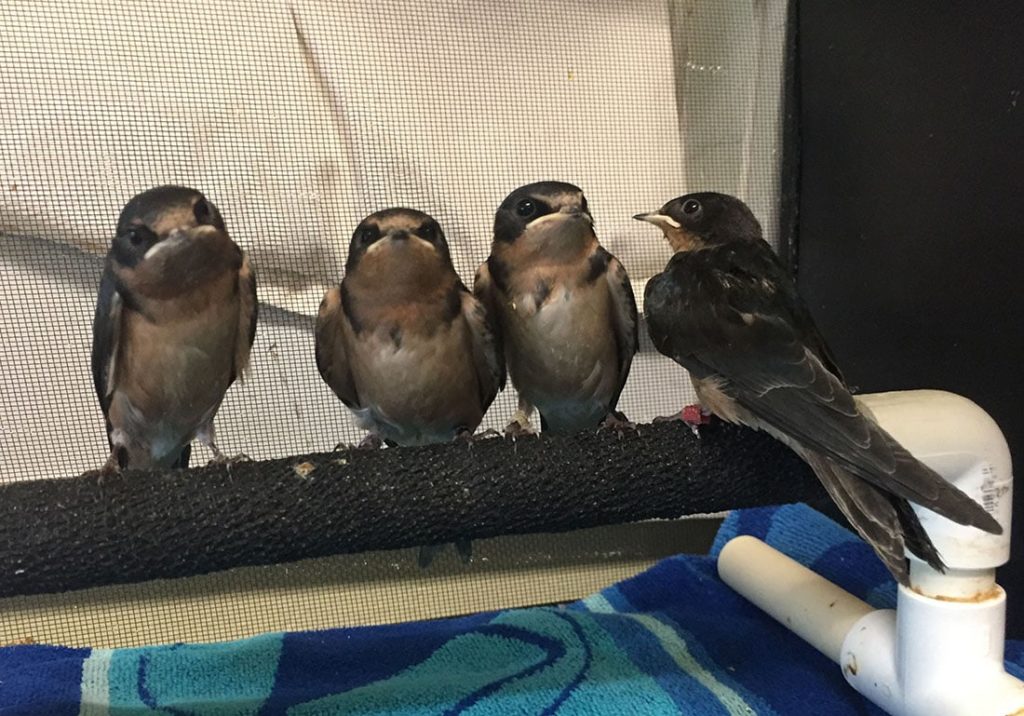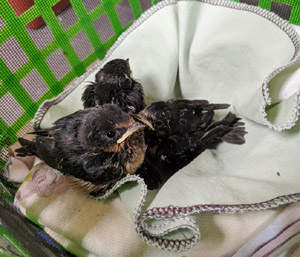Tuesday September 1, 2020 ~ METCHOSIN, BC
As submitted by BC Wild ARC | Island Social Trends
Five fledgling barn swallows were recently admitted to BC SPCA’s Wild Animal Rehabilitation Centre (Wild ARC) after a well-meaning member of the public had been caring for them for a week after he found their nest on the ground and believed them to be orphaned.
“On arrival, one of the swallows was assessed as being in critical condition with labored breathing and was declining fast. Unfortunately, the most humane option for this little bird was euthanasia,” says Tara Thom, assistant manager, Wild ARC. “A second swallow also declined quickly after admission and although the bird was provided with oxygen and a constant temperature within an incubator, it passed away shortly after.
The remaining three swallows were found to be thin and dehydrated with poor feather quality.
Feather management and hydration:

“Feather quality is extremely important for birds to keep them dry and warm in all weather conditions,” says Thom.
“For the first few days wildlife rehabilitators spent time gently cleaning old food pieces off their feathers. Rehabilitators were careful not to damage the feathers further and could only clean small areas at a time to prevent the birds from getting too wet and cold and also to minimize the amount of handling and stress for the birds.”
The swallows also received regular fluid therapy to rehydrate them, as well as a specialized formula to ensure they received the nutrition they needed to gain weight and grow up healthy and strong.
After three weeks of specialized care including appropriate diet, enclosures, and enrichment, the three swallows were able to fly and feed on their own and were ready for release!
Specialty care:
Despite good intentions, Thom says this story serves as a reminder to leave wildlife rehabilitation to the professionals.
“Wildlife rehabilitation is not just feeding an animal. Not only does it require provincial and federal permits, wildlife rehabilitation requires knowledge of the natural history of over 140 different species admitted to Wild ARC each year,” she says.
“Wildlife rehabilitation also requires a facility with enclosures suitable for each stage of development through to release as well as equipment to provide accurate and timely diagnoses and treatment including x-rays, surgeries, oxygen therapy, and medication to name just a few. Every day and at each stage of development, wildlife rehabilitators are closely monitoring weight gain (or loss), assessing feather or fur condition, and assessing the animals’ overall condition and behavior.”
Thom says it’s important for the public to realize wildlife rehabilitators are highly trained and skilled at providing the specialized care these animals need for a second chance at life in the wild. If you find a wild animal that may need help, please call the BC SPCA’s knowledgeable Wildlife Assistants and Operators toll free at 1-855-622-7722 to help assess the situation.




